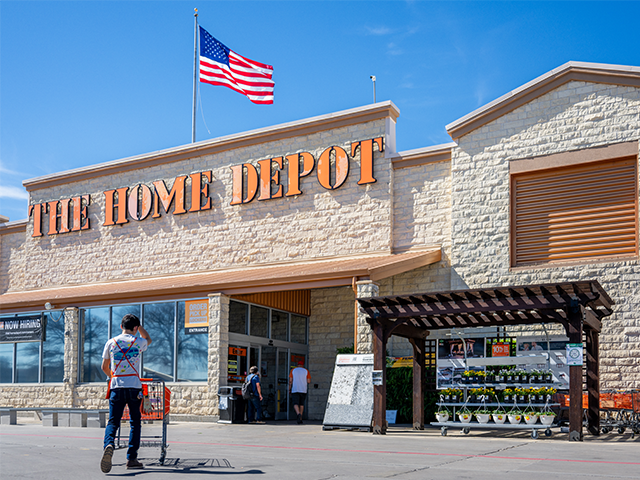Breitbart Business Digest: Home Depot’s $5.5 Billion Bet on the End of Cheap Labor

The Era of Unlimited Labor Supply Is Over
Home Depot’s $5.5 billion purchase of GMS Inc., a Georgia-based distributor of wallboard and steel framing, might look like a standard corporate acquisition. It’s anything but. Combined with last year’s $18 billion acquisition of SRS Distribution, this deal marks a quiet but profound shift in the logic of American business strategy. Companies are no longer assuming that labor is abundant. They’re building for a future where it’s scarce—and expensive.
For decades, American businesses operated on the assumption that low-skilled labor was essentially limitless. If you couldn’t find enough workers, you lobbied for more immigration or outsourced the work abroad. That era is ending. Immigration has fallen dramatically under President Trump’s second term, and popular opposition to mass immigration is rising across the developed world. As Bloomberg’s Adrian Wooldridge wrote last week, “The golden age for employers is coming to an end.”
Home Depot is adjusting faster than most. Rather than expanding its store count or doubling down on consumer retail, it’s investing billions to dominate the B2B supply chain for building contractors—a capital-intensive business with higher margins, lower labor dependence, and more scale potential.
A Strategy Forged by Scarcity
The acquisition will combine GMS’s 300 distribution centers with SRS’s national footprint, giving Home Depot control over more than 1,200 locations and 8,000 trucks. This is a play for volume, efficiency, and resilience in a market that has long been fragmented and labor-reliant.
The move parallels broader trends in construction and logistics: automate what you can, centralize what you can’t, and eliminate as many touchpoints with the traditional labor market as possible.
In short, scale replaces staffing.
The macroeconomic context matters. Trump’s restrictionist immigration policies have curbed both legal and illegal labor inflows. The tight labor market is no accident—it’s part of a deliberate policy shift meant to force investment in American workers, equipment, and training. Simultaneously, Trump’s tariff policy makes it more attractive to build and distribute domestically rather than import building materials piecemeal from abroad.
What Home Depot is doing isn’t just smart business—it’s a reaction to the new political economy of America. Companies that once lobbied for visa expansion are now building logistics networks and sponsoring apprenticeships. Some are turning to AI and automation. Others, like Home Depot, are placing massive bets on vertical integration and capital substitution.
Labor Policy Is Now Business Strategy
Wall Street is still catching up to this shift. Many analysts view consolidation deals like this through the lens of antitrust or market power. That misses the point. The real driver is labor scarcity. Businesses are realizing they can no longer rely on an elastic imported workforce to fill gaps. So, they’re redesigning their operations to minimize labor exposure entirely.
This is a reversal of the “import workers, not machines” model of the past 30 years. It also creates incentives to rebuild America’s domestic labor supply chains—through training, vocational education, and outreach to neglected communities. As Wooldridge put it, companies now need to treat talent pipelines like supply chains, planning and maintaining them with care.
If you want to understand what a Trump-era labor market looks like, don’t start with a jobs report. Start with a balance sheet. Watch where capital is going. The Home Depot–GMS deal shows us that forward-looking firms are planning for a world where labor is scarce, immigration is limited, and scale is king.